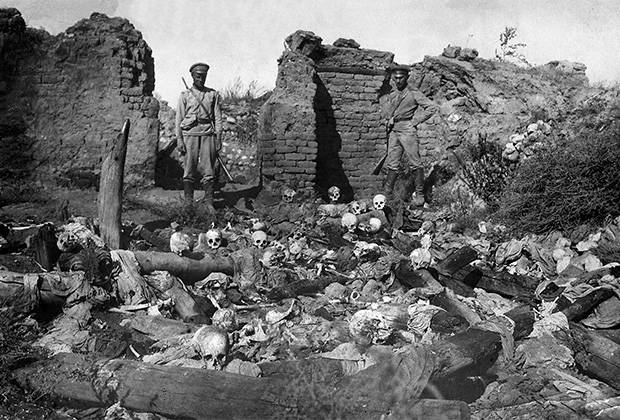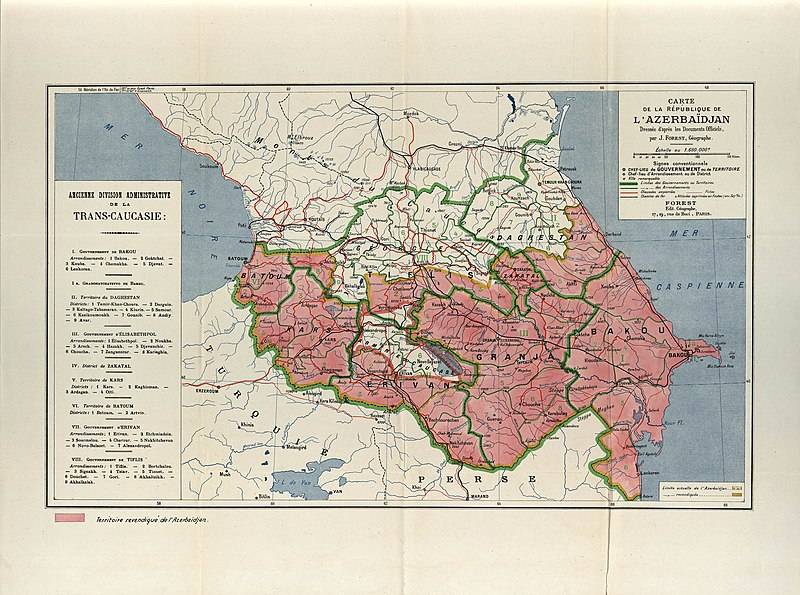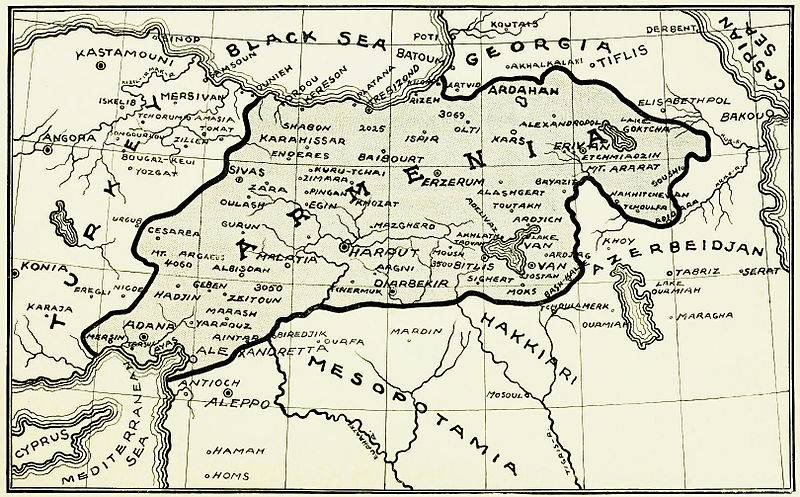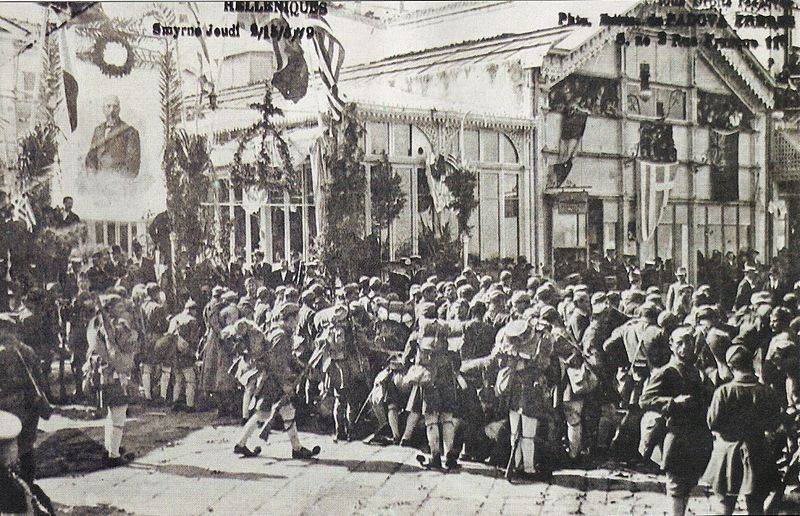How Turkey attacked Armenia

100 years ago, the Turkish army invaded Armenia. The war was caused, on the one hand, historical the conflict between the Turks and the Armenians, on the other hand - the intervention of the United States and the Entente in the affairs of the Caucasus.
Surrounded by enemies
After the collapse of the Russian Empire, the Armenian people had to experience great disasters. The First World War, when the Russian army was victoriously advancing on the Caucasian front, gave the Armenians hope for reunification with Western Armenia, which was under the Turkish yoke. The collapse of the Russian Empire and the beginning of the turmoil buried these hopes. Moreover, Turkey was now trying to implement its plans to annex the Caucasus. The Christian people of the Caucasus and especially the Armenians were threatened with genocide.
Soviet Russia, unable to wage war with Germany and Turkey, signed the "obscene" Peace of Brest, abandoning the territories of Western Armenia, as well as the regions of Batum, Kars and Ardahan, which had been recaptured from the Turks in the previous Russian-Turkish wars. The unviable Transcaucasian Federation (Georgia, Armenia and Azerbaijan) disintegrated, in May 1918 the First Republic of Armenia was created. Turkey, taking advantage of the situation of complete collapse in the South Caucasus, launched a large-scale invasion. The Armenians tried to resist, but could not offer serious resistance to the superior forces of the enemy. The war was accompanied by massacres and acts of genocide. Moreover, Armenia had no allies. Civil war was raging in Russia.
Relations with their immediate neighbors, Georgia and Azerbaijan, have been contradictory, unstable and often hostile due to territorial disputes. Azerbaijan took a pro-Turkish position and claimed historical Armenian lands. The Georgian authorities in their anti-Russian policy were guided by Germany and Turkey. Although it was a suicidal policy for Georgian Christians. As a result, tensions were established between the Transcaucasian republics, up to armed clashes and a trade and economic war. For example, the Georgians hijacked the entire rolling stock of the railway, blocked any supply of food from the north. Tiflis stated that Armenia is an unviable state. In Armenia, because of the blockade (the only transport route of Armenia to Russia, the railway, passed through the Georgian-controlled Batum), famine began. Until 1918, the Erivan region received a third of all foodstuffs from Russia.
Thus, Armenia found itself in complete isolation. The Armenians lost the 1918 war. Under the agreement in Batumi (June 1918), Armenia became a small enclave around the cities of Erivan and Echmiadzin. At the same time, local hostilities of Armenian detachments and pro-Turkish Muslim formations in Zangezur and Karabakh continued. However, the Ottoman Empire found itself in the camp of the losers during the world war. On October 30, 1918, the Mudross Armistice was signed. The Entente countries occupied the most important cities, ports and regions of Turkey. The Turks were forced to leave the occupied regions in the South Caucasus. In November 1918, the Armenians were able to return to Karaklis, in December to Alexandropol. At the same time, the evacuating Turkish forces took out everything they could (grain, livestock, fuel, metals, equipment) and destroyed the rest, leaving scorched earth behind. Later, overcoming the resistance of the Turks, who did everything to slow down the evacuation and create local Muslim military formations, the Armenians in the spring of 1918 established control over Kars, Oltu and Kagizman. Also, for a while, Armenia was able to occupy Nakhichevan.
Entente
The German-Turkish occupiers were replaced by British ones. England included Transcaucasia in its sphere of influence. British troops appeared in Batumi, Tiflis, Baku, Nakhichevan and Kars. The British established their control over the strategic Transcaucasian railway, the Baku-Batum oil pipeline. The arrival of the British "allies" caused great excitement in Armenia. Many hoped that with the help of the Entente, territorial disputes in the South Caucasus would be resolved, the socio-economic situation would be improved (problems of hunger, epidemics, lack of essential goods, etc.). True, it soon became clear that these hopes were illusory. The British had their own plans for the Transcaucasus - confronting Russia, capturing the tasty morsels of the fallen empire, and were not going to help Armenia. At the same time, they relied on Georgia and Azerbaijan and held back the creation of the Armenian army. The British refused to transfer the reserves of the Russian army in Kars to the Armenians. It was reported that weapon, ammunition and equipment will pass into the hands of the White Army, but in fact a significant part fell into the hands of Muslims.
In Armenia, they hoped that with the help of the West, a state would be created that would unite the Russian (eastern) and Turkish (western) parts of Armenia, and gain access to the Black Sea. Hoping for the help of the Entente in resolving the issue of Western Armenia, Erivan in 1919 sent its delegation to Paris for a peace conference, although the Armenians were not recognized as a belligerent party and were not even invited to France. On May 14, 1919, the Paris Conference delegated the mandate to Armenia to the United States. American President Woodrow Wilson sent General Harbord and the King-Crane Commission to Turkey to clarify the situation on the ground and decide on the possibility of creating an independent Armenian state under a US mandate.
It should be noted that there was no unity in Armenia itself at that time. The ruling Dashnaktsutyun (Armenian Revolutionary Commonwealth) party was split. Some politicians stood for the autonomy or federation of Armenia (including the western part) within Russia. The other part demanded an independent “Great Armenia” with access to the Black Sea, possibly to the Mediterranean Sea. The radicals hoped for a split in Turkey, where their own turmoil began, and for the support of the Entente. This "Great Armenia" project was supported by the United States. True, America was far away and was not going to support this idea by the force of its arms and economy. Armenian Social Democrats, associated with the Georgian Mensheviks, opposed relations with Russia. The social revolutionaries and the "people's party" (liberals) were in favor of joining with Russia. The Armenian government had to take into account the current dominance of the Entente in the region and its hostility towards Soviet Russia. Therefore, no attempts were made to improve relations with Moscow. And relations with the VSYUR (white movement) were built with an eye on the British. At the same time, the policy of the Denikinites, with their "one and indivisible" Russia, repelled Erivan.
Wars with Georgia and Azerbaijan
In December 1918, the Armenian-Georgian war broke out. The reason was the territorial dispute over the territory of Borchali district and Lori region, where rich copper mines were located. The population of the disputed areas was mixed, but with a predominance of Armenians. After the evacuation of Turkish troops from Akhalkalaki and Borchali districts, clashes broke out between Armenian and Georgian forces. Georgia placed all male Armenians between the ages of 18 and 45 in camps. Neither the Armenians nor the Georgians were able to achieve a decisive victory. The conflict was frozen with the mediation of Britain, which, in fact, supported Tiflis. In January 1919, an armistice was signed in Tiflis: the northern part of the Borchali district was transferred to Georgia, the southern part to Armenia, and the middle part was declared a "neutral zone" under the control of the British. In the future conflict between Armenia and Turkey, Georgia took a neutral position.
Territorial disputes, acts of mutual massacre, the conflict in Nakhichevan led to the Armenian-Azerbaijani war of 1918-1920. The parts of the former Russian Elizavetpol province were controversial: the Kazakh district, Nagorno-Karabakh and Zangezur. The Republic of Armenia fought against Muslim formations in Nakhichevan, Surmaly, Sharur-Daralagez, Erivan districts of the former Erivan province, the Republic of Azerbaijan confronted the units of the Armenian National Councils in Karabakh and Zangezur. At the same time, the Transcaucasian republics avoided direct conflict with each other. The conflict had historical, ethnic, religious, economic and strategic preconditions and was accompanied by bloody massacres. Turkey and England actively intervened in the war. Denikin's government provided military material assistance to Armenia and exerted diplomatic pressure on Baku. The war was stopped only by the establishment of Soviet power, first in Azerbaijan, then in the entire South Caucasus. In the spring of 1920, the Red Army defeated the remnants of the Denikinites in the North Caucasus and reached the borders of Azerbaijan. In April 1920, the Soviet 11th Army and the Caspian flotilla carried out the Baku operation (Baku “Blitzkrieg” of the Red Army). Soviet power was established in Azerbaijan, the ASSR was proclaimed.
In May 1920, an uprising of local Bolsheviks and Muslims against the ruling Dashnaktsutyun party began in Armenia. The uprising was supported by Soviet Russia and the ASSR. The Dashnaks suppressed the uprising, its leaders were executed. As a result, it was not possible to immediately establish Soviet power in Armenia, as in Georgia. On June 2, two Soviet states (Russia and the ASSR), on the one hand, and Armenia, on the other, came to an agreement on a ceasefire in Karabakh, Zangezur, Nakhichevan and the Kazakh district, but separate clashes continued after that. On July 28, the Nakhichevan Soviet Socialist Republic was proclaimed in Nakhichevan. On August 10, a ceasefire agreement was signed between Armenia and Soviet Russia, securing the presence of Soviet troops on a temporary basis in the disputed territories: Zangezur, Karabakh and Nakhichevan.


Situation in Turkey
Turkey had its own quarrel at that time. The Ottoman Empire was defeated in the war and surrendered in October 1918. Demobilized the army, surrendered the fleet. She transferred strategic points, bases, railways, communications and warehouses to the Entente. The West began to dismember the Ottoman Empire. Turkey lost all its possessions in North Africa and the Arab world, withdrew troops from the South Caucasus. British, French, Italian and Greek troops began to occupy the most important points in Turkey, including the Bosphorus and Dardanelles, Constantinople. At the same time, the Entente was going to dismember and Turkey itself, to transfer parts of Anatolia to the Armenians, Kurds and Greeks. The intervention provoked resistance. All this took place against the backdrop of the most severe socio-economic crisis caused by the war. Complete collapse of the economy, finance, transport system and trade. Poverty and hunger. The flourishing of banditry, local conflicts at the borders.
The country has split. There were two centers of power - the Sultan government of Mehmed VI and the national liberation movement of Mustafa Kemal. The government of the Grand Vizier Damad Ferid Pasha was ready for an agreement with the Entente at any cost. The Sultan's government was in Constantinople occupied by the allies and was ready to fulfill any will of the West. With the support of the Entente, a "caliphate army" was formed. But in fact, the region was under the control of the sultan's authorities only in the area of the capital. In September 1919, the Turkish Congress of the Society for the Defense of the Rights of Anatolia and Rumelia was held in Sivas and a Representative Committee headed by Kemal was elected. Turkish patriots demanded that Turkish sovereignty be ensured within national borders and that parliament be convened. In January 1920, a new parliament was convened, in which Kemal's supporters had a majority. In March, Parliament was dispersed by the British. In response, in April the Kemalists formed a new parliament in Ankara - the Grand National Assembly (VNST), which declared itself the only legitimate authority in the country. The Kemalists declared that the Sultan was "held captive by the infidels" and therefore his orders were not subject to execution. Mehmed declared Kemal a rebel, he was sentenced to death in absentia.
The Entente tried to suppress the Turkish liberation movement. This mission was entrusted to the Greeks, who occupied Smyrna from 1919. In the summer of 1920, Greek troops launched an offensive in Anatolia, captured Bylykesir, Bursa. Also the Greeks occupied Adrianople (Edirne). The Greek authorities dreamed of “Greater Greece” (the restored Byzantine Empire). The Allies planned to give Greece the remaining Turkish possessions in Europe, Smyrna. In a year, the Greeks were able to occupy the western part of Anatolia, and their successes ended there.

To be continued ...
- Alexander Samsonov
- https://ru.wikipedia.org/
- Smoot. 1920 year
Battle of Rostov
The disaster of white Odessa
How Slashchev Crimea defended
Dono-Manych battle
The death of the Northern Army Miller
Why Western agent Kolchak is turned into a hero and martyr of Russia
The defeat of the army of Denikin in the battle of Tikhorets
How did the Ice Siberian campaign end
The fall of the White Kuban
Agony of White Novorossiysk
The death of the Kuban army
Denikin's resignation
Far Eastern Republic and the Japanese threat
Polish "liberation" campaign in Kiev
Baku “Blitzkrieg” of the Red Army
The battle for Belarus. May operation of the Red Army
War of the Russian Army Wrangel
The first victories of the Wrangel army
The defeat of the 13th Soviet Army in Northern Tavria
Our Kiev!
The battle for Rivne. How Budyonnovtsy smashed the Polish defense
Minsk is ours! The defeat of the Polish army in Belarus
Battle for Lviv. The failure of the Red Army in Galicia
The death of the cavalry group Rednecks
The fierce battle for the Kakhovsky bridgehead
The defeat of the landing group Ulagaya
"Miracle on the Vistula"
How Tukhachevsky destroyed his armies on the Vistula
Battle of Komarov. Defeat of the 1st Cavalry Army
Bukhara Blitzkrieg Frunze
"The danger of Wrangel is becoming enormous ..."
Battle on the Lower Dnieper
The last offensive of the Russian army
Battle of the Neman
Defeat of Tukhachevsky on the Neman
The defeat of the 3rd Soviet army in Belarus
The defeat of the Red Army on the Shara
Information